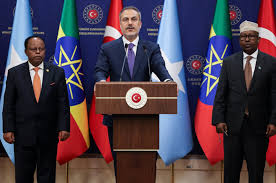Facebook Twitter (X) Instagram Somali Magazine - People's Magazine
Diplomatic negotiations seek to resolve tensions over Ethiopia’s bid for a trade corridor while upholding Somalia’s sovereignty and regional stability
A day after Somali President Hassan Sheikh Mohamud and Ethiopian Prime Minister Abiy Ahmed met to restore diplomatic ties, technical discussions between the two nations have begun in Ankara. These talks aim to implement the Ankara Declaration and address Ethiopia’s request for maritime access through Somali territory.
Somali Minister of Information Daud Aweis confirmed his participation in the negotiations, emphasizing that the Somali delegation’s primary goal is to ensure agreements from previous diplomatic engagements are upheld. He stated on X, formerly Twitter, that he had arrived in Ankara to join the discussions focused on exploring ways to implement the Ankara Declaration. He reaffirmed Somalia’s commitment to fostering peace, strengthening regional cooperation, and building diplomatic relations based on mutual understanding and respect.
Ethiopia has been actively seeking access to a maritime trade corridor, a move that has fueled geopolitical tensions in the Horn of Africa. The situation intensified on January 1, 2024, when Ethiopia signed a Memorandum of Understanding with Somaliland, proposing that Addis Ababa receive a 19-kilometer stretch of coastline near Berbera for a period of 50 years in exchange for potential Ethiopian recognition of Somaliland’s independence. This agreement was met with strong opposition from Somalia’s federal government, which deemed it an infringement on its sovereignty. The Somali government firmly rejected the deal, asserting that any negotiations concerning Somali territorial waters must be conducted directly with the federal government and must comply with international law.
The ongoing technical discussions in Turkey are a significant step toward resolving these tensions. Representatives from both governments are assessing the feasibility of a framework that would allow Ethiopia controlled maritime access under Somali oversight. While Ethiopia remains determined to secure a reliable trade route to the sea, Somalia insists that any agreement must be transparent and must not compromise its territorial integrity. Turkey, which maintains strong diplomatic and military ties with Somalia, has played a role in mediating regional disputes. The Ankara Declaration, signed in December 2024, laid the groundwork for these negotiations. However, it is unclear whether Turkey is actively facilitating the current discussions or merely providing a venue for the Somali delegation.

The outcome of these talks carries significant geopolitical implications for the Horn of Africa. A well-structured agreement could strengthen economic ties between Ethiopia and Somalia, enhancing regional stability and fostering greater economic cooperation. Improved trade relations and maritime access could benefit both nations, particularly Ethiopia, which is currently landlocked and reliant on neighboring countries for access to international markets. However, failure to reach a consensus could escalate existing tensions. If negotiations break down, Ethiopia may pursue alternative strategies, leading to further diplomatic conflicts. Additionally, unresolved disputes could be exploited by insurgent groups such as al-Shabaab, which have historically taken advantage of political instability to expand their influence and recruit fighters.
Regional and international actors are closely monitoring the situation. The African Union, the United Nations, and influential nations with strategic interests in the Horn of Africa may play a role in shaping the direction of these discussions. The United States, the European Union, and Gulf nations, which have vested economic and political interests in the region, may also contribute to the resolution of this issue as talks progress.
As discussions continue, both Somalia and Ethiopia face critical decisions that could determine the future of their bilateral relations. If a compromise can be reached that respects Somalia’s sovereignty while addressing Ethiopia’s economic needs, it could mark a significant step toward long-term regional stability. Conversely, failure to find common ground could deepen divisions and contribute to further uncertainty in an already fragile geopolitical landscape. The coming days will be crucial in determining whether the Ankara talks will lead to a sustainable resolution or whether tensions will persist, shaping the political and economic dynamics of the Horn of Africa for years to come.

